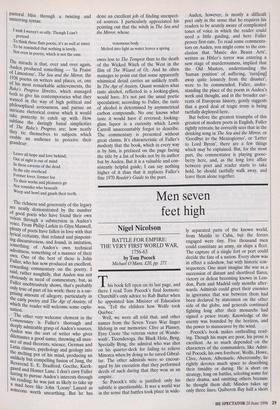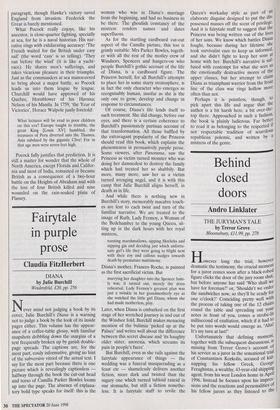Men seven feet high
Nigel Nicol son
BATTLE FOR EMPIRE: THE VERY FIRST WORLD WAR, 1756-63 by Tom Pocock Michael O'Mara, £20, pp. 271 This book fell open on its last page, and there I read Tom Pocock's final footnote: Churchill's only advice to Rab Butler when he appointed him Minister of Education was, 'Tell the children how Wolfe took Quebec.'
Well, we were all told that, and other names from the Seven Years War linger lifelong in our memories: Clive at Plassey, Eyre Coote 'the veteran victor of Wande- wash', Ticonderoga, the Black Hole, Byng. Specially Byng, the admiral who was shot on his quarter-deck for failing to relieve Minorca when by doing so he saved Gibral- tar. The other admirals were so encour- aged by his execution that they performed deeds of such daring that they won us an empire. So Pocock's title is justified: only his subtitle is questionable. It was a world war in the sense that battles took place in wide- ly separated parts of the known world, from Manila to Cuba, but the forces engaged were tiny. Five thousand men could constitute an army, six ships a fleet. The capture of a single fort or port could decide the fate of a nation. Every show was in effect a sideshow, but with historic con- sequences. One must imagine the war as a succession of distant and shortlived flares, victory or defeat becoming known in Lon- don, Paris and Madrid only months after- wards. Admirals could greet their enemies in ignorance that war between them had been declared by statesmen on the other side of the globe, and generals continued fighting long after their monarchs had signed a peace treaty. Knowledge of the enemy was bounded by the horizon, and the power to manoeuvre by the wind. Pocock's book makes enthralling read- ing. Though his maps are poor, his prose is excellent. As so much depended on the characters of the commanders, like Admi- ral Pocock, his own forebear, Wolfe, Howe, Clive, Anson, Albemarle, Abercromby, he rightly devotes much space to describing their timidity or daring. He is short on strategy, long on battles, selecting some for their drama, and omitting others because he thought them dull; Minden takes up only three lines, Quiberon Bay half a short paragraph, though Hawke's victory saved England from invasion. Frederick the Great is barely mentioned.
What Pocock really enjoys, like his ancestor, is close-quarter fighting, specially at sea, for he is a naval historian. His nar- rative rings with exhilarating accuracy: 'The French waited for the British under easy sail' (the word 'easy' is so telling). 'They ran before the wind' (it is like a yacht- race). He shares men's sufferings, and takes vicarious pleasure in their triumphs. Just as the commanders at sea manoeuvred to bring about a major battle, so Pocock leads us into them league by league. Churchill would have approved of his Quebec, Hornblower of his Havana; Nelson of his Manila. In 1759, 'the Year of Victories', Horace Walpole justly foretold:
What lectures will be read to poor children on this era? Europe taught to tremble, the great King [Louis XV] humbled, the treasures of Peru diverted into the Thames, Asia subdued by the gigantic Clive! For in that age men were seven feet high.
Pocock fully justifies that prediction. It is still a matter for wonder that the whole of North America, except Florida and Califor- nia and most of India, remained or became British as a consequence of a two-hour battle on the Heights of Abraham and with the loss of four British killed and nine wounded on the rain-soaked plain of Plassey.



























































 Previous page
Previous page